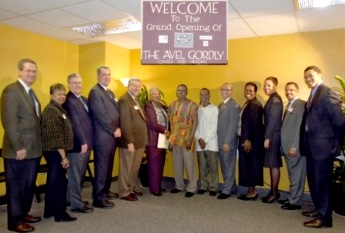Filmmaker Nili Yosha (left) with Susie Schenk, second left and some of the stars of a short Mental Health First Aid documentary, that seeks to raise awareness about the training. David Boston, second right, who we featured last April in a story about Project Viewfinder, says he recommends the training to anyone interested in helping family and friends. |
Mental Health First Aid teaches how to help when friends or family are going through a mental health disorder. Why does it matter? Because more than 50 percent of us will deal with a mental disorder at some time in our lives.
Crazy, nuts, psycho, sad sack, cuckoo, messed up, loco, screwy, schizo, mental: The words we use to talk about people dealing with mental health problems say more about our fear and ignorance than they do about people with mental illness.
"There's a stigma that if you have a mental health issue you are crazy, you can't be trusted, that you are probably on drugs," says community health worker Roberta Tyler.
"What everyone needs to realize is that there are periods in people's lives when they deal with those illnesses. But it doesn't mean that you can't get to a place where you are recovered and can help others. People don't know this because there is so much stigma around mental illness."
Yet mental disorders are more common than heart disease and cancer added together. One in four people are dealing with mental illness at any one time. And around half of everyone will suffer from a mental disorder at some point in our lives. On the positive side, most people do recover, especially if they get help and support.
"You don't have to be a professional," says Susie Schenk, the lead crisis specialist with Clackamas County behavioral health.
"It only takes one person to make a difference and that person can be you."
That's the thinking behind a growing movement called Mental Health First Aid. Started in Australia in 2001, Mental Health First Aid reached the United States in 2008.
"It's a class that is really changing the dynamic and the understanding of mental health conditions around the world, Schenk says."
"If we as a community can become more welcoming and understanding, we're not going to see so many people suffering in silence. We're going to see people getting help earlier and getting on their way."
Mental Health First Aid is a day -long, hands-on training that teaches community members the ABCs of mental health problems. Take the class and by the end of the day you will know the signs and symptoms of different mental illnesses, as well as how and when to get professional help. You will have the tools and the confidence to help family and friends who are suffering.
Clackamas County Centerstone is taking the lead locally, offering classes in Mental Health First Aid. They are open to everyone and cost $100, with a reduced price of $75 for anyone involved in a support organization, such as Folk Time.
"If cost is a problem let us know, because we can possibly find you a scholarship," Schenk says.
Roberta Tyler and her granddaughters LaQuoya, LaCrisha Tyler took the youth Mental Health First Aid class this summer. Tyler says her elder granddaughter had a friend struggling with suicidal feelings and desperately wanted to know how to help him.
 The Avel Gordly Center for Healing offers culturally specific treatment for African Americans dealing with mental health disorders. The center is located at 621 SW Alder St., Suite 520. Call 503-494-4745 for an appointment. For youth and families dealing with a psychosis (a break from reality that can include symptoms such as hearing voices and paranoid feelings among others) Multnomah County's EASA program offers 24/7 support and help. For advice, appointments and referrals call EASA at 503-988 -3272 For the 24/7 Crisis Line: 503-988-4888 |
"They were begging me, please, please can we do this class," Tyler said. "And it was phenomenal. I learned so much from the kids who shared their stories. And I learned so much about mental health. It really gives you tools you can use."
The three feature in a short documentary film about the class that aired at the Bing lounge in downtown Portland, Oct. 11. Directed by Nili Yosha, the film showed young people and family members going through the training.
The film was sponsored by mental health peer-to-peer support organization, Folk Time, along with Open Minds Open Doors, a Clackamas County campaign to reduce discrimination against mentally ill people.
People often know that a loved one is going through a depression or experiencing some kind of problem, but they don't know what to say or how to help. Taking the class gives people the skills and the words to break that silence
So how would the world be different if thousands more people understood what mental illness is and knew how to help?
"I think there would be more openness in general, which would lead to more people getting help earlier," Schenk says. "And we know that the earlier you get help, the better the outcome is likely to be. So I think we'd see less isolation and a lot more people getting help, getting better and moving on with their lives."






















































































































































































































































































































